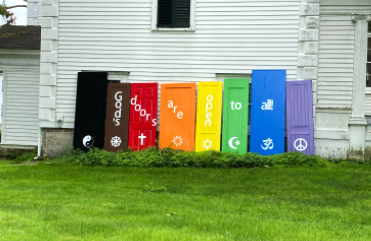New Bills Threaten The Trans Community
Tennessee. Nebraska. Kentucky. Georgia. Mississippi. Kansas. These states have recently passed anti-trans bills and laws, affecting not only the people in those states but also people around the country.
As of May 2, 2023, there are 474 anti-LGBTQ+ bills around the country (ACLU), ranging from restrictions on what can be taught in school to health care to banning same-sex marriage. These bills do not all impact the trans community directly, but the effect is felt widely. Teachers in certain states may have to reveal a student’s sexuality or gender to the family, even if the student protests. School curriculums are being changed to censor discussions about the LGBTQ+ community, or even outright ban the subject altogether.
Then it comes directly to the trans community. Fear of having the wrong gender and name on an ID might become a reality for some, which could lead to more harassment and even job loss. Some of the largest bills being passed impact the healthcare that a person can receive. This means someone may not be able to access gender-affirming care.
Access to gender-affirming care is the major concern of many. Gender-affirming care is a type of medical care related to physically changing a person’s body to match what they envision in their head. For some, this means chest-reductions surgery or plastic surgery. Others start taking hormones to help guide their body towards the gender they would like to appear as.
Increasing reports of trans teens feeling suicidal have been sent to politicians, to explain what could happen if these bills were enacted. A clinical psychologist based in Lincoln shared that there had been a rise in calls regarding suicide, specifically from teens who identify as part of the trans community. The warning states: “the bill ‘will result in the deaths of transgender and gender diverse adolescents, likely before the end of the school year.’”
Speaking with a trans senior student at Hall, the concern reaches a new level. His thoughts were on the further as he is getting ready to graduate. Seeing as he would like to pressure gender-affirming care, the place he selects to go to college is increasingly more important. Even after college there is still worry about where to live. It seems to be a never-ending cycle of worry.

But, why is this happening? While there is no clear reason, conversations swill around politics and the current political climate. Traditionalism, now called neotraditionalism, seeks to bring back older practices where there is more control over people through laws. This concept is intertwining with conservative Republicans’ views and creates a push to create these laws. Passing these bills helps keep conservative Republican voters content with the effort to ‘protect the children’.
A factor could also be what is being called a culture war between the two political parties. The battles are being fought over the place of religion in schools, critical race theory, LGBTQ+ issues, and multiple other topics. The implementations of many new laws lead to the idea of attempting to please Republican voters. Connecting back to the LGBTQ+ community means protecting children from gender-affirming care by restricting care by age and taking the discussion out of schools.

Many questions will remain unanswered as the bills move forward or are stopped and the fight for trans rights continues. Major politicians are speaking out such as John Fredrickson, an openly gay man in the Nebraska Legislature. He said, “To my LGBTQ family… regardless of what happens today, heads up… We’re survivors.”
And, while the fight is not happening here, the words of encouragement are echoed back to those who are fighting. Talking with Ell Zirolli, a junior at Hall, they had some words of encouragement that have been echoed by many: “we’re [the trans and non-gender conforming community] never going away, that’s a truth they are going to have to accept.” Another student mentioned looking at those who have succeeded through the trials of being outwardly trans and the comfort it brings him. There is security in knowing that change can happen, but it takes brave voices to make that change.
Looking inward, what has Hall done to accommodate the trans and non-gender-conforming students within its walls? Hall’s choir teacher, Brett Boles, makes sure that his classroom is accepting of all. Within the extracurriculars hosted by the choir department, participants are encouraged to sing with the group “they would be more comfortable in.” Attire is also an issue that students don’t need to worry about. Boles said, “I try to work out attire so that it’s comfortable for whoever wants to wear whatever.” This flexibility has allowed students to feel accepted in the program and allow the class to be a safe space. Overall, the arts have become a safer space for LGBTQ+ people and these steps are helpful for those who may be exploring who they are.





